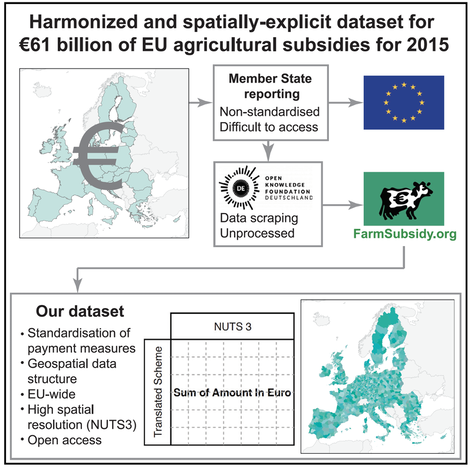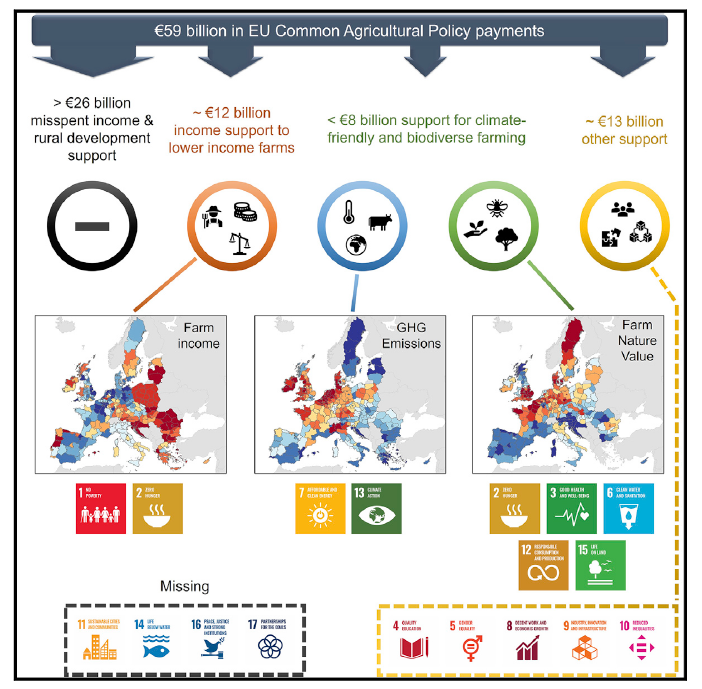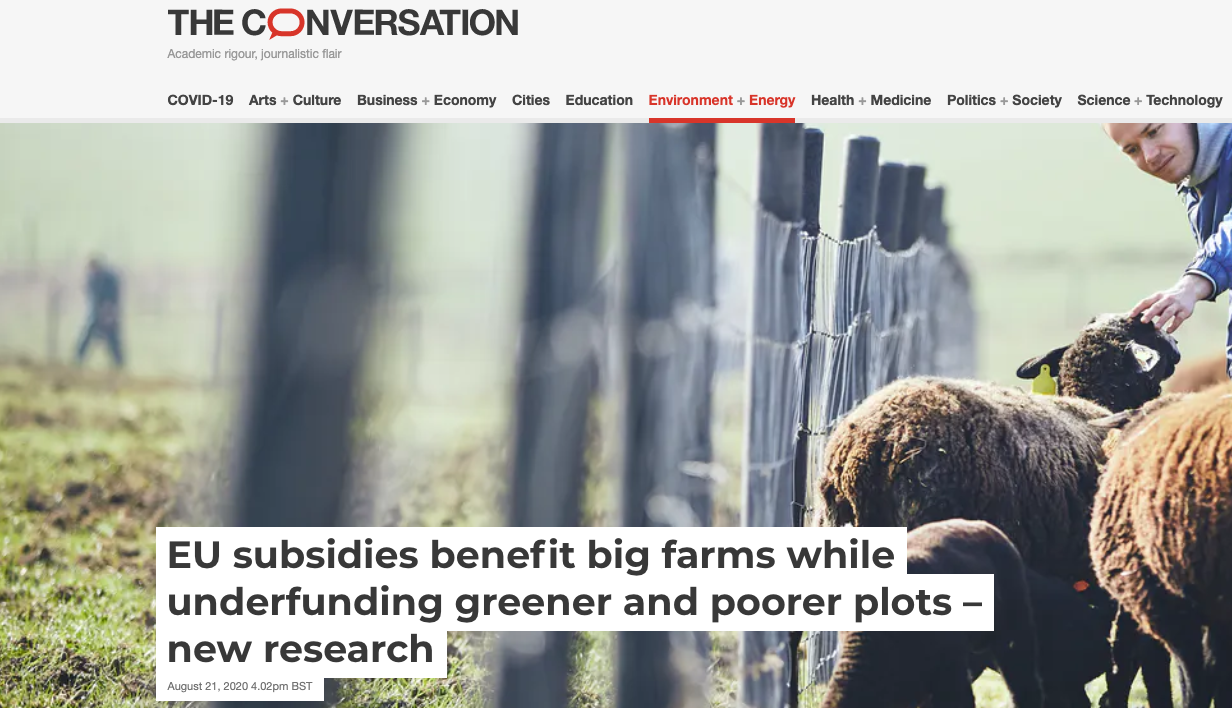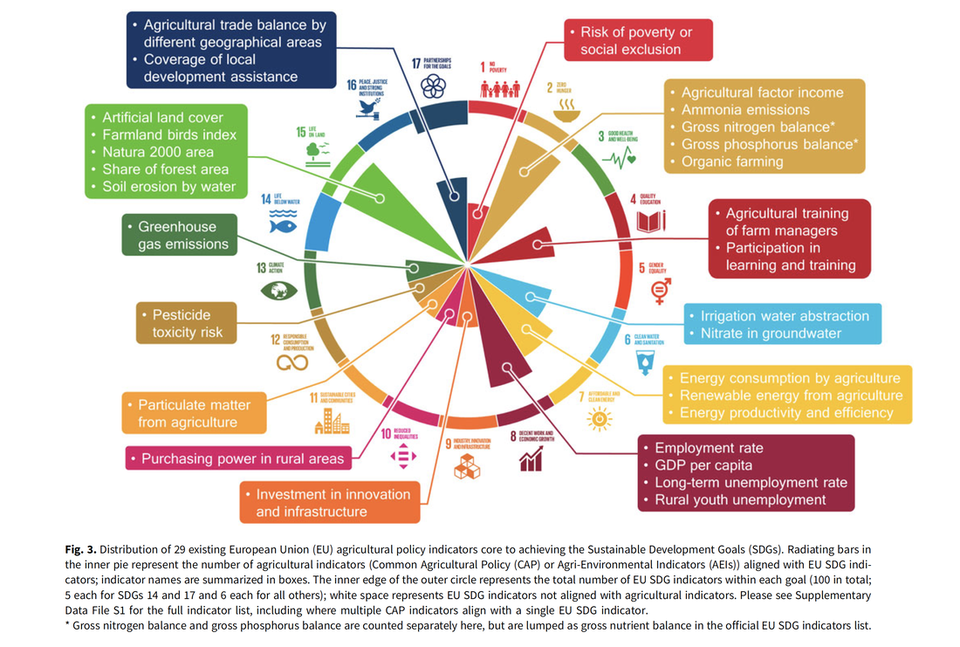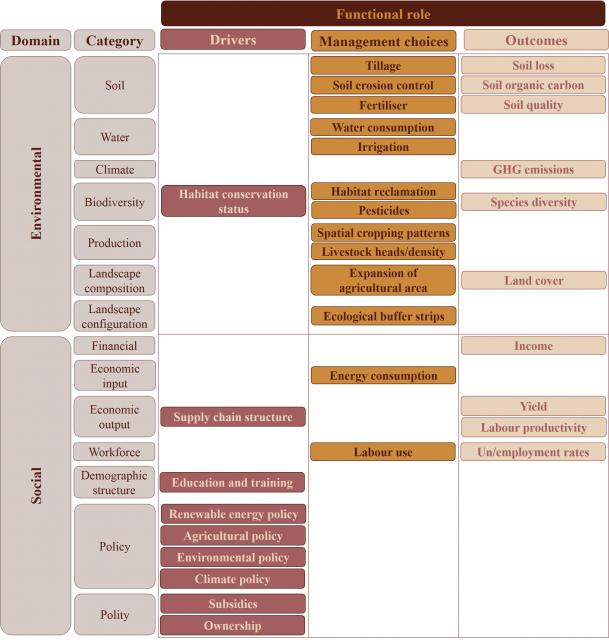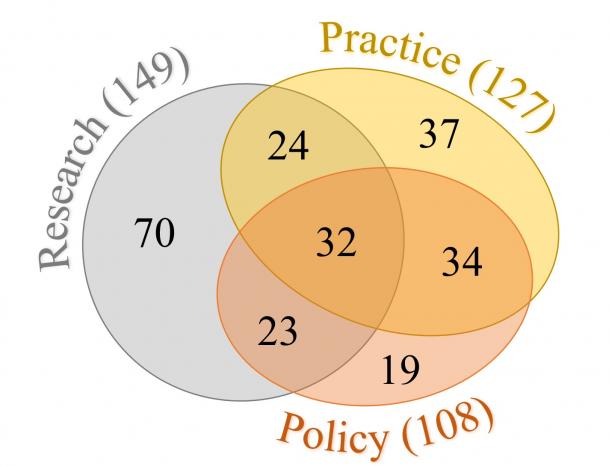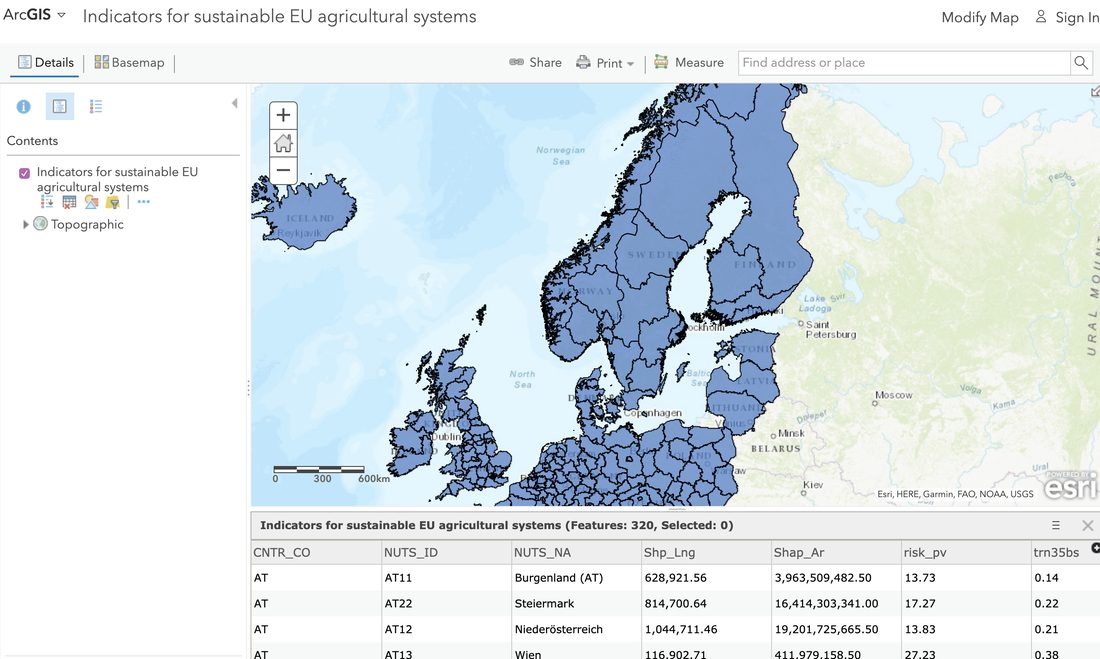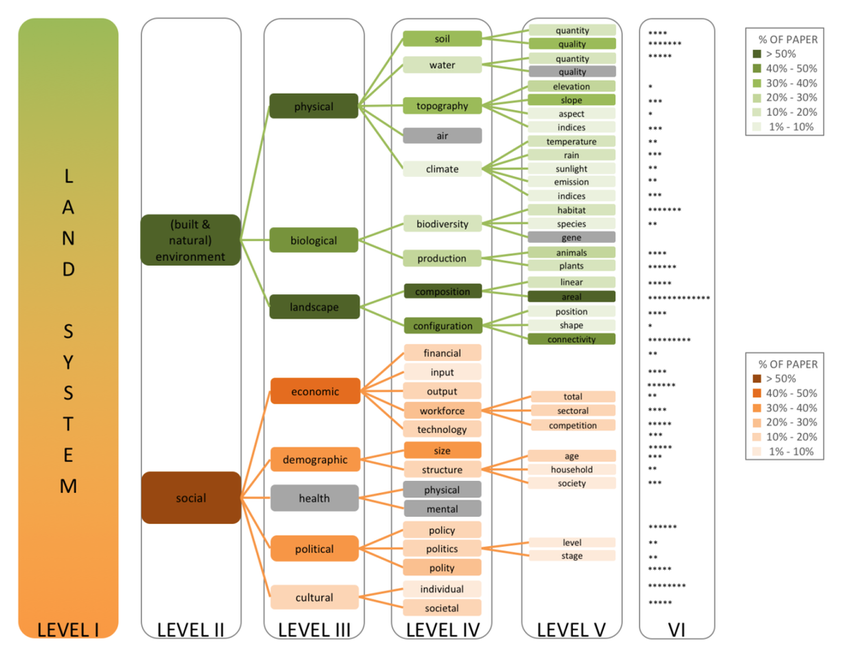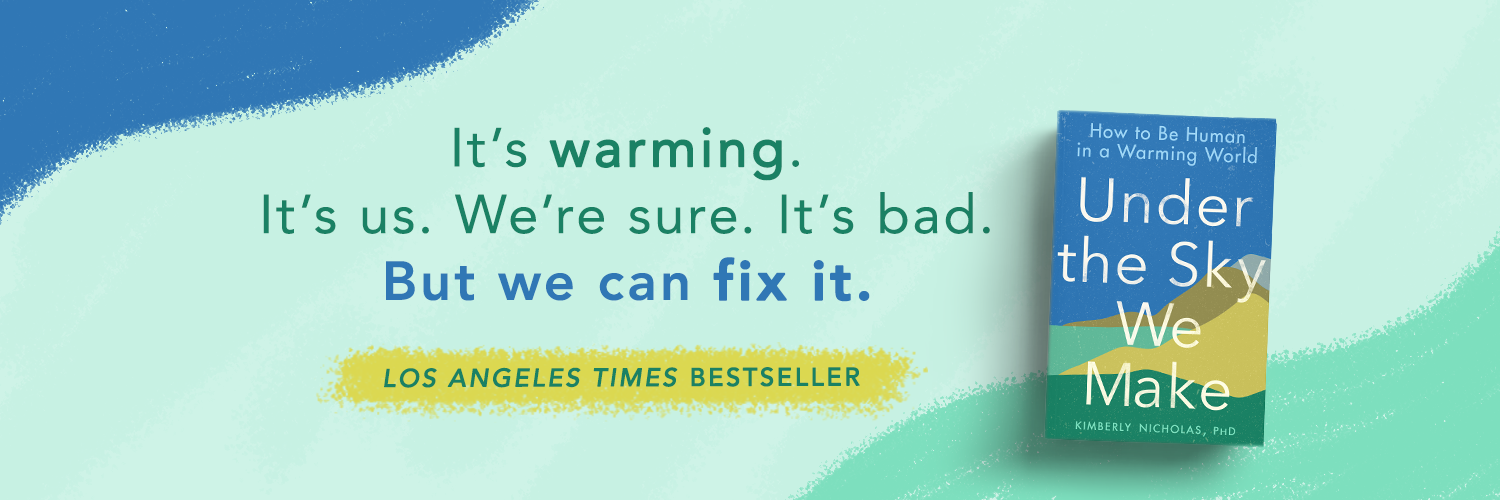Environmental, economic, and social trade-offs of European farming systems
I led this research project with support from the Swedish Research Council Vetenskapsrådet from 2015-2020 to characterize and evaluate agricultural systems and their social and environmental trade-offs, with the ultimate aim to identify policy options and leverage points to manage land for food, fuel, and fibre production more sustainably in Europe.
Project Summary- Popular Science
3 key research results
Research effects on society
We have worked to widely share our research with key decisionmakers and wider society, including through presentations at Almedalen, to Jordbruksverket and Näringsdepartamentet, and through a widely viewed European digital seminar bringing together scientists, practitioners, and policy experts.
We conducted focus groups with key stakeholders in policy and civil society, and wrote one popular science research summary in The Conversation, as well as two policy briefs (“Jordbrukspolitik för att nå FN:s globala mål,” in Swedish, and one in English written by the European Commission DG Environment and sent to over 22,000 academics, policymakers, and businesspeople across Europe.)
Our work has successfully informed the public through media coverage in major journals and newspapers, including Dagens Nyheter and featured as a Research Highlight in Nature Sustainability.
We have shared research results on social media, for example, this Twitter thread summarizing research findings from Scown and Nicholas 2020, and this livetweet thread of the Green Farming Now conference, as well as on our home institution, LUCSUS’ website and the Lund University website as well as on this project website.
- We identified gaps between science, policy, and practice for sustainable food systems in Europe. In particular, we found research is often designed with a much greater focus on environmental sustainability, while policy often focus on social sustainability.
- We developed methods to bring science, policy, and practice closer together, including a method to objectively track and measure the contribution of a policy towards meeting the UN Sustainable Development Goals (Agenda 2030). This method can be applied to any policy.
- From the first comprehensive effort to map and analyze individual farm payments, we found that nearly half of the current €60 billion in spending under Europe’s largest budget item, the Common Agricultural Policy, is misspent. Viable income support is the largest goal of the CAP. We found that more than €24 billion in 2015 went to regions where average farm incomes are already above the EU median income, indicating that further income support is not needed. Meanwhile, CAP payments to the poorest 40% of regions are not sufficient to make farm income reach the EU median. The majority of this misspent income support went to the most climate-polluting and least biodiversity-friendly farmland, thus counteracting the CAP’s environmental goals. A further €2.5 billion intended for rural development was paid to primarily urban areas. We conclude that the CAP needs fundamental reform to achieve its goals, most importantly, making income support needs-based and environmental payments results-based.
Research effects on society
We have worked to widely share our research with key decisionmakers and wider society, including through presentations at Almedalen, to Jordbruksverket and Näringsdepartamentet, and through a widely viewed European digital seminar bringing together scientists, practitioners, and policy experts.
We conducted focus groups with key stakeholders in policy and civil society, and wrote one popular science research summary in The Conversation, as well as two policy briefs (“Jordbrukspolitik för att nå FN:s globala mål,” in Swedish, and one in English written by the European Commission DG Environment and sent to over 22,000 academics, policymakers, and businesspeople across Europe.)
Our work has successfully informed the public through media coverage in major journals and newspapers, including Dagens Nyheter and featured as a Research Highlight in Nature Sustainability.
We have shared research results on social media, for example, this Twitter thread summarizing research findings from Scown and Nicholas 2020, and this livetweet thread of the Green Farming Now conference, as well as on our home institution, LUCSUS’ website and the Lund University website as well as on this project website.
Project Summary- Research Findings
Research Question |
Findings from this project |
What variables does land systems research in Europe currently study, and what variables should be included to approach land systems as social-ecological systems? |
We identified a core set of 154 social and environmental variables in European land systems research, which we have arranged in a hierarchical classification that can be used to guide research design. Currently research studies four times more environmental than social variables. A better balance would more closely align research with policy and thus offer greater societal benefit. (Winkler et al., 2018) |
How do agricultural land systems research, policy, and practice measure progress toward the United Nations Sustainable Development Goals in Europe, and how can these perspectives be better aligned? |
We identified 32 consensus variables key to sustainable agricultural land systems in current European research, policy, and practice, including social drivers like policies, environmental farm management choices such as tillage, and both social and environmental outcomes. These 32 variables should be in focus to achieve the Sustainable Development Goals (SDGs) in practice. (Scown et al., 2019) |
What is the geographic pattern of key social and environmental land systems variables across Europe? |
We've conducted extensive data cleaning and validation to publish a harmonized and open access geospatial database and online visualization, containing 127 variables relevant for agriculture and the SDGs in Europe, such as greenhouse gas emissions from agriculture, areas of habitat conservation, and rural risk of poverty. (Scown, 2020) |
How do the indicators used to monitor the EU Common Agricultural Policy align with the Sustainable Development Goals? |
Despite European ambition to be a world leader in the SDGs and sustainable agriculture, current indicators for the Common Agricultural Policy (CAP) are not well-aligned with the SDGs, with disproportionate focus on three of the 17 goals, and four goals entirely missing. (Scown & Nicholas 2020) |
How can policies be objectively evaluated for their contribution to meeting the UN SDGs? |
We developed an objective, quantitative method to align monitoring and evaluation of local or national policies with the SDGs based on existing indicators, which can support evidence-based policy to help achieve the SDGs. (Scown & Nicholas 2020) |
How does CAP spending align with its stated objectives? |
At least €27 billion of EU agricultural subsidies were misspent in 2015: increasing income inequality, paying polluters, and directing rural development funds to cities (Scown et al. 2020). |
How can public spending for the CAP be aligned with its purpose and geographic location for 16 million farm payments across Europe? |
We translated, aligned, and made spatially explicit data reported by Member States, so that 16 million individual farm payments across Europe under the CAP can be analyzed by location and purpose. (Nicholas et al. 2021) |
How can local case studies of sustainable agriculture inform policy design and challenges at the European scale? |
German winegrowers were encouraged to adopt organic agriculture by their own beliefs and supportive social networks, but discouraged by skeptical attitudes and financial barriers (Siepmann and Nicholas, 2018). Consumers in Iceland favored increasing local food, but justified their lack of local food purchases based on perceived sustainability concerns (Halldorsdottir and Nicholas, 2018). |
Project Videos
For more, see our YouTube channel and Slideshare page!
New study: "A harmonized and spatially explicit dataset from 16 million payments from the European Union's Common Agricultural Policy for 2015" (Nicholas et al., 2021, Patterns)
|
Public spending under the European Union’s Common Agricultural Policy has been difficult to analyze at a fine spatial resolution. Here we present a dataset that for the first time harmonizes spending across member states by location and purpose drawn from 16 million individual payments in 2015. When coupled with existing data on social and environmental outcomes, our spending data enable analysis of how effectively public money is being spent to achieve policy goals.
|
"Billions in Misspent EU Agricultural Subsidies Could Support the Sustainable Development Goals" (Scown, Brady, & Nicholas, 2020, One Earth)
Our new study shows at least €27 billion of EU agricultural subsidies were misspent in 2015: increasing income inequality, paying polluters, and directing rural development funds to cities. Read more in the full study and popular science summary above.
Press release
Selected press coverage: Courthouse News, Dagens Nyheter (in Swedish)
Twitter thread by Guy Pe'er and Sebastian Lakner, CAP experts who coauthored a comment on our study
In Swedish: "Miljarder från EU:s jordbruksstöd hamnar fel, visar ny kartläggning"
Featured in the Thin Ink Substack newsletter on food systems and climate change
Press release
Selected press coverage: Courthouse News, Dagens Nyheter (in Swedish)
Twitter thread by Guy Pe'er and Sebastian Lakner, CAP experts who coauthored a comment on our study
In Swedish: "Miljarder från EU:s jordbruksstöd hamnar fel, visar ny kartläggning"
Featured in the Thin Ink Substack newsletter on food systems and climate change
"European agricultural policy requires a stronger performance framework to achieve the Sustainable Development Goals" (Scown & Nicholas, 2020, Global Sustainability)
Study highlights and takeaways, including a video interview.
Technical Summary:
Agriculture is crucial to achieving the Sustainable Development Goals (SDGs), but the ambitious claims for the sector’s contribution have not been sufficiently scrutinized. We use existing measurable policy indicators for the European Union’s Common Agricultural Policy (CAP) to systematically align the policy with the SDGs. We find that current CAP indicators focus on three goals: zero hunger (SDG 2), decent work (SDG 8) and life on land (SDG 15). Important SDGs are entirely missing from the agricultural indicators, including health (SDG 3), gender equality (SDG 5), oceans (SDG 14) and institutions (SDG 16), contradicting recent reports proclaiming agriculture’s contribution to all SDGs globally. We analyse the alignment of CAP indicators across policy stages and between CAP Pillars, finding that the SDGs are best covered by CAP Target, Result and Impact indicator sets, and in Pillar II of the CAP supporting rural development. More transparent and objective assessment by the European Union and its Member States using measurable indicators is needed in order to ensure evidence based policy supports agriculture and other sectors to achieve their widely touted potential to contribute to the SDGs.
Agriculture is crucial to achieving the Sustainable Development Goals (SDGs), but the ambitious claims for the sector’s contribution have not been sufficiently scrutinized. We use existing measurable policy indicators for the European Union’s Common Agricultural Policy (CAP) to systematically align the policy with the SDGs. We find that current CAP indicators focus on three goals: zero hunger (SDG 2), decent work (SDG 8) and life on land (SDG 15). Important SDGs are entirely missing from the agricultural indicators, including health (SDG 3), gender equality (SDG 5), oceans (SDG 14) and institutions (SDG 16), contradicting recent reports proclaiming agriculture’s contribution to all SDGs globally. We analyse the alignment of CAP indicators across policy stages and between CAP Pillars, finding that the SDGs are best covered by CAP Target, Result and Impact indicator sets, and in Pillar II of the CAP supporting rural development. More transparent and objective assessment by the European Union and its Member States using measurable indicators is needed in order to ensure evidence based policy supports agriculture and other sectors to achieve their widely touted potential to contribute to the SDGs.
Read more in my Twitter thread summarizing the study.
Aligning research, policy, & practice on sustainable agricultural land systems in Europe (Scown et al., 2019, PNAS)
We have identified a subset of 32 variables recognized as key to sustainable agricultural land systems in current European research, policy, and practice. These focus on social drivers like climate, agricultural and environmental policy; environmental farm management choices such as tillage, irrigation, and cropping patterns; and both social and environmental outcomes, including soil management, greenhouse gas emissions, and yields. We suggest these variables represent a shared consensus on elements important to achieving the Sustainable Development Goals in practice, though they may also identify gaps where agriculture is falling short of its potential to do so.
Read more in our press release
Open Access Publication: Scown, Winkler, and Nicholas, 2019, PNAS
This research was summarized as a two-page policy brief by Science for Environment Policy, a news service published by the European Commission's Environment Directorate-General, and sent to over 22,000 academics, policymakers, and businesspeople across Europe.
Read more in our press release
Open Access Publication: Scown, Winkler, and Nicholas, 2019, PNAS
This research was summarized as a two-page policy brief by Science for Environment Policy, a news service published by the European Commission's Environment Directorate-General, and sent to over 22,000 academics, policymakers, and businesspeople across Europe.
Open access geospatial database of sustainable European agriculture
|
We've published an open access geospatial database containing 127 variables relevant for agriculture and the Sustainable Development Goals in Europe, including greenhouse gas emissions from agriculture, crop yields, areas of habitat conservation, rural risk of poverty, water abstraction in agriculture, and many others. The variables can be visualised on ArcGIS online for around 300 regions throughout the EU and nearby states (e.g., Norway, Turkey). Link to online data visualization using ArcGIS Database and documentation can be downloaded on GitHub |
"A classification to align social-ecological land system research with policy in Europe" (Winkler et al., 2018, Land Use Policy)
We have identified a core set of 154 variables examined in current land systems research, which we have arranged in a hierarchical classification that can be used to guide research design to include important variables from both social and environmental domains (currently only 60% of research papers studied did so, with an average of four times greater focus on environmental variables). We have also examined European policies and science-policy frameworks, finding that they focus more on social variables currently under-represented in research. We identify existing data sources that could be used to encourage more balanced social-ecological research design and is better aligned with broader policy goals. (Open Access publication: Winkler, Scown, and Nicholas, 2018, Land Use Policy).
Ongoing Research
Mapping and modeling sustainable agricultural systems in Europe
We are currently mapping and modeling social and environmental performance of European agricultural systems (work led by Murray Scown) to identify bright spots of sustainability, and hotspots of damage. Stay tuned!
We are currently mapping and modeling social and environmental performance of European agricultural systems (work led by Murray Scown) to identify bright spots of sustainability, and hotspots of damage. Stay tuned!
Core Project Publications
Kimberly A. Nicholas, Frida Villemoes, Edmund Lehsten, Mark V. Brady, and Murray W. Scown. (2021) “A harmonized and spatially-explicit dataset from 16 million payments from the European Union’s Common Agricultural Policy for 2015.” Patterns 2 (4): 100236. https://doi.org/10.1016/j.patter.2021.100236
Murray W Scown, Mark V Brady, and Kimberly A Nicholas. (2020). “Billions in Misspent EU Agricultural Subsidies Could Support the Sustainable Development Goals.” One Earth 3: 237-250. https://doi.org/10.1016/j.oneear.2020.07.011
Scown, Murray, and Kimberly A Nicholas. (2020). “European agricultural policy requires a stronger performance framework to achieve the Sustainable Development Goals.” Global Sustainability 3, e11, 1–11. https://doi.org/10.1017/sus.2020.5
Scown, Murray, Klara J Winkler, and Kimberly A Nicholas. “Aligning research, policy and practice on sustainable agricultural land systems in Europe.” (2019) Proceedings of the Natural Academy of Sciences of the USA (PNAS) 116 (11) 4911-4916. https://doi.org/10.1073/pnas.1812100116
Winkler, Klara J, Murray S Scown, and Kimberly A Nicholas. 2018. “A classification to align social-ecological land systems research with policy in Europe.” Land Use Policy 79 (137-145). https://doi.org/10.1016/j.landusepol.2018.06.034
Murray W Scown, Mark V Brady, and Kimberly A Nicholas. (2020). “Billions in Misspent EU Agricultural Subsidies Could Support the Sustainable Development Goals.” One Earth 3: 237-250. https://doi.org/10.1016/j.oneear.2020.07.011
Scown, Murray, and Kimberly A Nicholas. (2020). “European agricultural policy requires a stronger performance framework to achieve the Sustainable Development Goals.” Global Sustainability 3, e11, 1–11. https://doi.org/10.1017/sus.2020.5
Scown, Murray, Klara J Winkler, and Kimberly A Nicholas. “Aligning research, policy and practice on sustainable agricultural land systems in Europe.” (2019) Proceedings of the Natural Academy of Sciences of the USA (PNAS) 116 (11) 4911-4916. https://doi.org/10.1073/pnas.1812100116
Winkler, Klara J, Murray S Scown, and Kimberly A Nicholas. 2018. “A classification to align social-ecological land systems research with policy in Europe.” Land Use Policy 79 (137-145). https://doi.org/10.1016/j.landusepol.2018.06.034
Conference Presentations
2021:
Seminarium: Fördelning av jordbruksstöd mellan FN:s hållbarhetsmål. Jordbruksverket. Med Mark Brady. 16 April 2021.
Digitalt seminarium om CAP och FN:s hållbarhetsmål. Näringsdepartementet (Swedish Ministry of Enterprise and Innovation), med Mark Brady. 9 April 2021.
"Billions in misspent EU agricultural subsidies could support climate, biodiversity, and equality." Green Farming Now! Virtual conference. Sponsored by BirdLife International and Good Food, Good Farming. My conference summary (Twitter thread) and link to my talk.
2020
"The Common Agricultural Policy post-2020: A new Green Architecture, Novel Eco-schemes and biodiversity indicators. How can scientists and science help making it work?" Workshop at Lund University. November 2020.
2019
Aligning research, policy, and practice for the Sustainable Development Goals in European agriculture. American Geophysical Union Annual Meeting. Session: Agriculture in the 21st Century: Leveraging Technological Advances to Provide Insights and Promote Sustainability. Wed, Dec 11, 201908:00-10:00Moscone South, eLightening Theatre III. San Francisco, California, USA
"Improving the Sustainability Performance of the Common Agricultural Policy." Speaker and Co-Organizer, "CAP Reform: Working together for an environmentally ambitious, evidence-based agricultural policy.” Workshop at Center for Environment and Climate Research, Lund University. 5 December 2019.
KA Nicholas. "Sustainable agricultural land systems in Europe." (Mon, Aug 26, 2019). LUCSUS Research Kickoff. Kockum Fritid. Malmö, Sweden.
KA Nicholas. "Aligning research, policy, and practice for the Sustainable Development Goals in European agriculture." In: "Sustainable Land Use? Synergies, Conflicts, and Solutions for Sweden and Beyond" Seminar with Kimberly Nicholas (Lund University), Emma Johansson (Lund University), Genevieve Metson (Linköping University), held at the Lund University "Knowledge Corner," Almedalen (Sweden's festival of democracy and ideas). Jul 4, 2019. Visby, Sweden
Murray W. Scown, Klara J. Winkler, and Kimberly A. Nicholas. “A tale of two perspectives: aligning land systems research and policy for the Sustainable Development Goals in European agriculture.” Oral presentation, 4th Open Science Meeting of the Global Land Programme, April 24-26, 2019, Bern, Switzerland
2018
“Interdisciplinary Land System Science.” Panel discussion with Sara Brogaard, Lina Eklund, Veiko Lehsten, Ali Mansourian, Kimberly Nicholas, and Jasper van Vliet. 1 February, Department of Physical Geography and Ecosystem Science, Lund University. (Invited)
Murray W Scown, Klara J Winkler, Kimberly A Nicholas. “Seeing the landscape for the farm: Combining conceptual and empirical approaches to understand agricultural systems.” Landscape 2018: Frontiers of Agricultural Research, 12-16 March, Berlin.
2017
Klara J. Winkler, Murray Scown, and Kimberly A. Nicholas. “A review of causes and consequences of rural land use in Europe.” European Landscape Ecology Congress, Ghent, 12-15 September 2017.
2016
Kimberly A Nicholas, Mark V Brady, Stefan Olin, Johan Ekroos, Marianne Hall, Jonathan W. Seaquist, Veiko Lehsten and Henrik Smith. “Defining, Measuring, and Incentivizing Sustainable Land Use to Meet Human Needs.” Oral presentation at American Geophysical Union, San Francisco, CA, USA. 12-16 December, 2016.
Kimberly A Nicholas, “Climate mitigation, biodiversity and ecosystem services in a changing climate.” BECC Annual Meeting, Varberg, Sweden. October 23. (Invited)
Kimberly A Nicholas, “Meeting the Sustainable Development Goals: Who, What, When, Where, Why, and How?” The First Danish Future Earth Summit: SDG Challenges for Nordic Countries. Copenhagen, Denmark. June 3. (Invited)
2014
KA Nicholas. “Mapping the environmental, economic, and social tradeoffs of European farming systems across scales.” Oral presentation at Centre for Environmental and Climate Research, Lund University, Lund, Sweden.
Seminarium: Fördelning av jordbruksstöd mellan FN:s hållbarhetsmål. Jordbruksverket. Med Mark Brady. 16 April 2021.
Digitalt seminarium om CAP och FN:s hållbarhetsmål. Näringsdepartementet (Swedish Ministry of Enterprise and Innovation), med Mark Brady. 9 April 2021.
"Billions in misspent EU agricultural subsidies could support climate, biodiversity, and equality." Green Farming Now! Virtual conference. Sponsored by BirdLife International and Good Food, Good Farming. My conference summary (Twitter thread) and link to my talk.
2020
"The Common Agricultural Policy post-2020: A new Green Architecture, Novel Eco-schemes and biodiversity indicators. How can scientists and science help making it work?" Workshop at Lund University. November 2020.
2019
Aligning research, policy, and practice for the Sustainable Development Goals in European agriculture. American Geophysical Union Annual Meeting. Session: Agriculture in the 21st Century: Leveraging Technological Advances to Provide Insights and Promote Sustainability. Wed, Dec 11, 201908:00-10:00Moscone South, eLightening Theatre III. San Francisco, California, USA
"Improving the Sustainability Performance of the Common Agricultural Policy." Speaker and Co-Organizer, "CAP Reform: Working together for an environmentally ambitious, evidence-based agricultural policy.” Workshop at Center for Environment and Climate Research, Lund University. 5 December 2019.
KA Nicholas. "Sustainable agricultural land systems in Europe." (Mon, Aug 26, 2019). LUCSUS Research Kickoff. Kockum Fritid. Malmö, Sweden.
KA Nicholas. "Aligning research, policy, and practice for the Sustainable Development Goals in European agriculture." In: "Sustainable Land Use? Synergies, Conflicts, and Solutions for Sweden and Beyond" Seminar with Kimberly Nicholas (Lund University), Emma Johansson (Lund University), Genevieve Metson (Linköping University), held at the Lund University "Knowledge Corner," Almedalen (Sweden's festival of democracy and ideas). Jul 4, 2019. Visby, Sweden
Murray W. Scown, Klara J. Winkler, and Kimberly A. Nicholas. “A tale of two perspectives: aligning land systems research and policy for the Sustainable Development Goals in European agriculture.” Oral presentation, 4th Open Science Meeting of the Global Land Programme, April 24-26, 2019, Bern, Switzerland
2018
“Interdisciplinary Land System Science.” Panel discussion with Sara Brogaard, Lina Eklund, Veiko Lehsten, Ali Mansourian, Kimberly Nicholas, and Jasper van Vliet. 1 February, Department of Physical Geography and Ecosystem Science, Lund University. (Invited)
Murray W Scown, Klara J Winkler, Kimberly A Nicholas. “Seeing the landscape for the farm: Combining conceptual and empirical approaches to understand agricultural systems.” Landscape 2018: Frontiers of Agricultural Research, 12-16 March, Berlin.
2017
Klara J. Winkler, Murray Scown, and Kimberly A. Nicholas. “A review of causes and consequences of rural land use in Europe.” European Landscape Ecology Congress, Ghent, 12-15 September 2017.
2016
Kimberly A Nicholas, Mark V Brady, Stefan Olin, Johan Ekroos, Marianne Hall, Jonathan W. Seaquist, Veiko Lehsten and Henrik Smith. “Defining, Measuring, and Incentivizing Sustainable Land Use to Meet Human Needs.” Oral presentation at American Geophysical Union, San Francisco, CA, USA. 12-16 December, 2016.
Kimberly A Nicholas, “Climate mitigation, biodiversity and ecosystem services in a changing climate.” BECC Annual Meeting, Varberg, Sweden. October 23. (Invited)
Kimberly A Nicholas, “Meeting the Sustainable Development Goals: Who, What, When, Where, Why, and How?” The First Danish Future Earth Summit: SDG Challenges for Nordic Countries. Copenhagen, Denmark. June 3. (Invited)
2014
KA Nicholas. “Mapping the environmental, economic, and social tradeoffs of European farming systems across scales.” Oral presentation at Centre for Environmental and Climate Research, Lund University, Lund, Sweden.
Selected Press and Policy Briefs
Jordbrukspolitik för att nå FN:s globala mål?
Policy brief by Science for Environment Policy, a news service published by the European Commission's Environment Directorate-General, and sent to over 22,000 academics, policymakers, and businesspeople across Europe, summarizing Scown et al., 2019, PNAS.
Aiora Zabala. "Divergent perspectives." Research Highlight in Nature Sustainability 9 April 2019 on Scown et al., 2019, PNAS.
Policy brief by Science for Environment Policy, a news service published by the European Commission's Environment Directorate-General, and sent to over 22,000 academics, policymakers, and businesspeople across Europe, summarizing Scown et al., 2019, PNAS.
Aiora Zabala. "Divergent perspectives." Research Highlight in Nature Sustainability 9 April 2019 on Scown et al., 2019, PNAS.
Additional Publications
In addition to the main project focus at the European scale, related case studies have been conducted to explore farm sustainability issues in specific European contexts at the local scale, as part of two masters' thesis projects where publication was supported by this VR grant:
Siepmann, Laura, and Kimberly A Nicholas. (2018) “German winegrowers’ motives and barriers to convert to organic farming.” Sustainability, 10(11), 4215; doi:10.3390/su10114215
Halldórsdóttir, TO, and KA Nicholas. (2016.) Local food in Iceland: Identifying behavioral barriers to increased production and consumption. Environmental Research Letters 11(11). doi:10.1088/1748-9326/11/11/115004
Halldórsdóttir, TO, and KA Nicholas. (2016.) Local food in Iceland: Identifying behavioral barriers to increased production and consumption. Environmental Research Letters 11(11). doi:10.1088/1748-9326/11/11/115004


